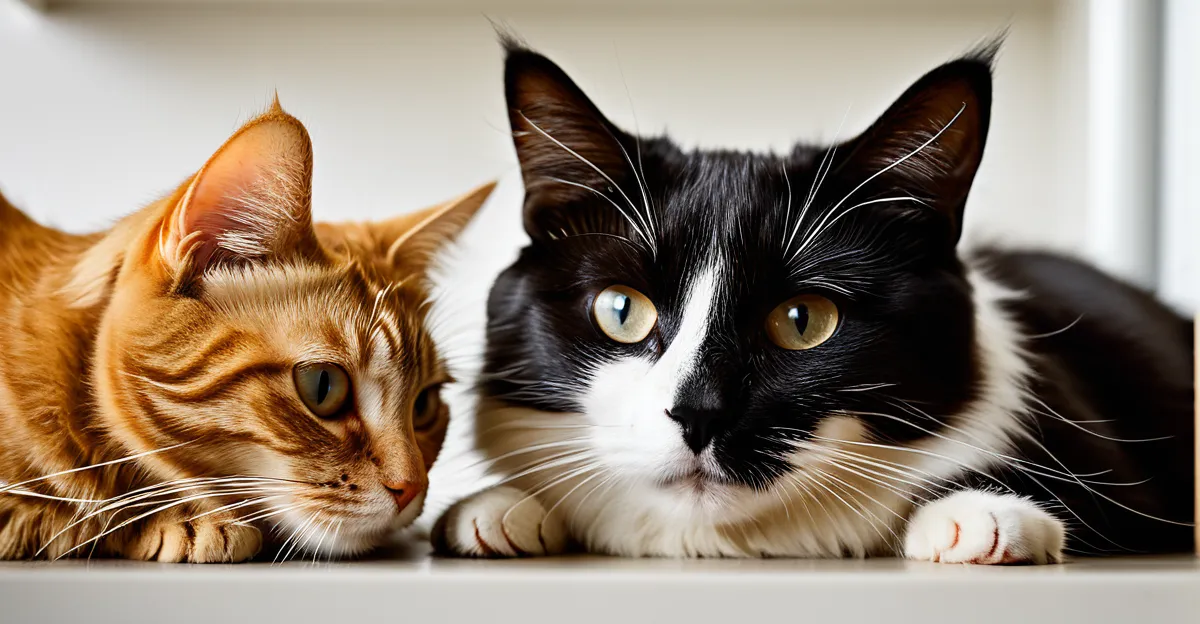Key Considerations for Pet Companions in UK Apartments
Choosing between cats vs dogs as apartment pets in the UK involves understanding how each species adapts to confined living spaces. Apartment pets must fit within the limitations of size, exercise opportunities, and landlord regulations common in UK apartment living.
One of the most significant considerations is space. Cats generally require less room and are more adaptable to smaller environments. In contrast, dogs, depending on breed and energy levels, may find apartment confinement challenging without regular outdoor walks. Urban living often limits access to green spaces, a key factor influencing dog suitability.
Also to see : How can I train my pet to adapt to UK weather conditions?
Landlord policies in the UK also play a pivotal role in pet choice. Many apartments have strict rules regarding pet presence, often favoring cats due to their quieter nature and litter-trained independence. Dogs can face restrictions, especially larger breeds, or those prone to barking, which can disturb neighbours.
Lifestyle needs align closely with pet suitability. For residents with busy schedules or limited mobility, cats tend to offer more independence, while dogs require commitment to exercise and social interaction. Considering these factors early helps prospective pet owners select companions that harmonise with their daily routines and living conditions.
Topic to read : How Can You Enhance Your Pet’s Quality of Life in the UK?
Understanding these aspects of cats vs dogs and what it means for UK apartment living ensures pet owners can make informed decisions about which type of apartment pet best suits their environment and lifestyle.
Pros and Cons of Cats in Apartment Settings
Cats are often considered ideal apartment pets for UK apartment living due to their natural independence and adaptability to confined spaces. One of the major benefits of cats is their smaller size, which allows them to comfortably navigate limited floor areas without the need for extensive exercise outdoors. Their litter-trained nature is another strong advantage, as it eliminates the need for frequent outdoor walks, fitting well with residents who have busy schedules or restricted access to green spaces.
However, there are some potential drawbacks to consider when choosing cats for apartments. Allergies to cat dander are a significant concern for many people, which can affect both the pet owner and neighbours in close living quarters. Additionally, cats may exhibit scratching behaviours that could damage furniture or fixtures, posing challenges in rented properties where damage might result in deposit deductions. Despite their general quietness, some landlords maintain restrictions on cats due to worries about allergies or property damage, making it important to verify landlord pet policies UK before adopting.
In sum, cats offer many conveniences for those seeking a low-maintenance yet affectionate companion in tight urban environments. Their behaviours generally align well with UK apartment living, but prospective owners should remain mindful of allergies and the need to manage scratching and potential landlord concerns.
Pros and Cons of Dogs in Apartment Settings
Dogs can be wonderful apartment pets in UK flats, offering companionship and loyalty that many urban dwellers appreciate. Among the benefits of dogs for apartments are their social nature and trainability, which can foster strong bonds with owners and even provide a sense of security. Unlike cats, dogs often thrive on active interaction, making them suitable for residents who can commit to daily exercise routines despite limited indoor space.
However, dogs in UK apartment living face notable challenges. One key issue is their exercise requirements; many dog breeds need frequent outdoor walks and mental stimulation to maintain health and behaviour. Limited access to nearby parks or green spaces can complicate meeting these needs. Furthermore, barking due to boredom or anxiety may disturb neighbours, a frequent concern in tightly packed flats. Space restrictions also play a role—larger breeds or highly energetic dogs may struggle in confined environments, making careful breed selection critical.
The best dog breeds for flats often include smaller or calmer types that adapt well to indoor living and have manageable exercise needs. Examples include French Bulldogs, Cavalier King Charles Spaniels, and Pugs. These breeds tend to be quieter and less prone to hyperactivity indoors. However, every dog’s needs vary, so potential owners should evaluate breed characteristics alongside their own lifestyle and available outdoor access to ensure a harmonious apartment experience.
Practical Factors for UK Apartment Dwellers
When considering pet care in UK apartments, understanding landlord regulations is essential. Many landlords have strict pet policies in the UK that influence pet suitability. For instance, some properties only allow certain types of apartment pets or restrict the number and size of animals. Tenants should always confirm landlord pet policies UK before bringing home a companion, as violating these rules can lead to tenancy issues or fines.
Accessibility to outdoor spaces also affects pet welfare. In many UK urban areas, limited green spaces challenge dog owners, who must meet their pets’ exercise needs despite restricted options. Cats generally cope better with this aspect, requiring less outdoor time. Additionally, the UK’s climate—with frequent rain and cold months—can impact routine walks for dogs, making indoor exercise or supplementary stimulation necessary.
Noise plays a crucial role in neighbour relations. Barking dogs may cause disturbances in close quarters, leading to complaints or conflicts. Cats tend to be quieter, which can ease tensions in shared living environments. Being mindful of how pet behaviour affects neighbours is part of responsible pet care in UK apartments and contributes to a harmonious community atmosphere.
Ultimately, choosing between cats and dogs in the context of UK apartment living involves balancing personal lifestyle, landlord policies, and the urban environment to ensure both pet and owner thrive together.
Care and Lifestyle Compatibility
Choosing between cats vs dogs for UK apartment living often hinges on the alignment of pet care needs with an owner’s lifestyle. Cats generally demand less active maintenance, making them suited to those with busy schedules. Their natural independence and ability to self-entertain reduce the need for constant interaction or outdoor exercise. This independence categorizes them among the most low maintenance pets in apartment settings, ideal for singles or professionals with limited free time.
Dogs, conversely, require more consistent attention, especially regarding daily walks and mental stimulation. These activities are vital for canine health and behaviour but can be challenging for urban residents with demanding routines. Therefore, dogs may be less suitable for individuals with unpredictable or long working hours. However, for those who can commit to regular care, dogs provide unmatched companionship and emotional support.
When evaluating pet care needs, consider the intensity of exercise and social requirements. Cats adapt well to indoor environments, needing less space and no outdoor access, while dogs benefit from active engagement and outdoor outings. UK apartment dwellers with families or couples often find dogs rewarding if their lifestyle accommodates these needs. Meanwhile, cats remain the preferred choice for those seeking companionship without substantial daily commitments.
In practical terms, selecting busy lifestyle pets like cats supports a harmonious coexistence between urban demands and animal welfare. For more interactive pets, planning routines around dog care is essential to ensure mutual wellbeing in confined living. Ultimately, matching the pet’s needs with owner capacity determines the success of shared life in a UK apartment.
Recommended Breeds and Real-World Experiences
Selecting the best cat breeds for apartments is crucial for ensuring harmony in UK apartment living. Breeds like the British Shorthair and Scottish Fold are popular among urban dwellers for their calm temperaments and adaptability to indoor life. These cats are generally affectionate yet independent, aligning well with the needs of tenants seeking low-maintenance companions that thrive in confined spaces.
When considering dogs, awareness of the best dog breeds for apartments is essential given the space and noise constraints common in flats. Smaller, quieter breeds such as the Cavalier King Charles Spaniel, French Bulldog, and Pug are frequently recommended by experts. These breeds exhibit moderate exercise needs and sociable demeanours, making them well-suited for the dynamics of apartment living in the UK. Their manageable size and lower barking tendencies reduce the risk of disturbing neighbours, a critical factor in dense urban housing.
Insights from local pet owners highlight the importance of breed characteristics matching lifestyle and environment. Many report positive experiences when choosing pets known to have adaptable personalities and predictable behaviours. For example, owners of British Shorthairs appreciate their content nature indoors, while dog owners praise smaller breeds for balancing companionship with exercise feasibility in limited outdoor spaces.
Resources tailored for apartment living with pets in the UK often emphasise researching breed-specific traits alongside individual pet temperaments. This approach helps prospective owners anticipate challenges such as exercise needs and noise levels, ensuring they select breeds that complement their living conditions. Consulting experts adds a layer of practical knowledge, reinforcing breed choices that support peaceful coexistence in shared housing.
Ultimately, careful breed selection grounded in UK-specific experiences and expert advice can greatly enhance the success of integrating pets into apartment lifestyles. This strategy benefits both owners and their animal companions by fostering well-matched households in urban settings.






